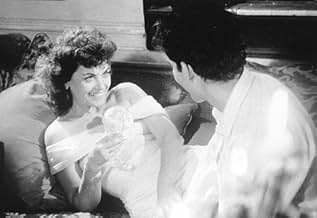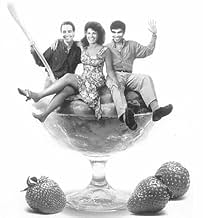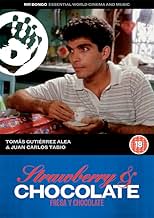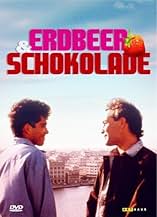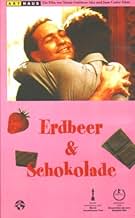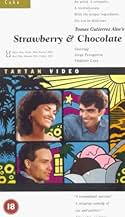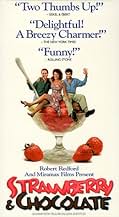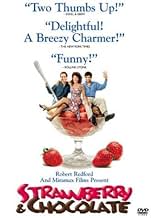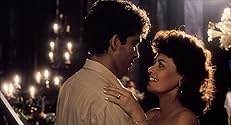VALUTAZIONE IMDb
7,4/10
6191
LA TUA VALUTAZIONE
Aggiungi una trama nella tua linguaStory of two men who are opposites: one gay, the other straight; one a fierce communist, the other a fierce individualist; one suspicious, the other accepting; and how they come to love each... Leggi tuttoStory of two men who are opposites: one gay, the other straight; one a fierce communist, the other a fierce individualist; one suspicious, the other accepting; and how they come to love each other.Story of two men who are opposites: one gay, the other straight; one a fierce communist, the other a fierce individualist; one suspicious, the other accepting; and how they come to love each other.
- Regia
- Sceneggiatura
- Star
- Candidato a 1 Oscar
- 25 vittorie e 2 candidature totali
Recensioni in evidenza
Fresa y chocolate
I liked to watch Fresa y Chocolate; this is first Cuban movie I've seen. Fresa y Chocolate is a product of two directors, Tomás Gutiérrez Alea and Juan Carlos Tabío in 1993. Fresa y Chocolate was nominated in 1995 the best foreign film. During the production of this film the director Alea had cancer and for this reason Tabío had to help him to complete the movie. Later 1996 Alea die. This movie expresses the oppression of Cuban government toward the homosexual and the conflict also the friendship within two different men.
Around 1997 in Cuba,Diego (Jorge Perugorria ) the main character is a cultured gay and David (Vldimir Cruz) a young revolutionary college student. He is a naive and dogmatic. The story begins at a cheap hotel room where David and his sweetheart, Vivian tried to have first intimate experience together but ended up angry at each other, later Vivian marries to a much older man who is in the government office position. David, the wedding day feeling low come to an Ice cream shop near by school and over there David and Diego meet. At the begging, it was Diego's attempt to allure David but soon it change and in spite of their sexuality, these two different men establish a true friendship. Most of story take a place at Diego's apartment where full of things (art work, forbidden books, pictures...) for David's eye. It is a new and different world for David, a dogmatic and in a way an ignorant. Diego tells David about his anguish and problem toward the government. For him being homosexual hinder his work in Cuba and also his well being, too.
However, David learns much about art and literature from Diego and moreover, he learn how to enjoy and savor life. The message of this movie is tolerance. No matter what is one's sexuality people have genuine heart. They have hope, dreams, and frustration that life brings us.
I think this movie is worth to watch because Fresa y Chocolate gave me a chance to give a glance to Cuba, the country that I don't know yet. To me watching a good film lessens a tension of life.
I liked to watch Fresa y Chocolate; this is first Cuban movie I've seen. Fresa y Chocolate is a product of two directors, Tomás Gutiérrez Alea and Juan Carlos Tabío in 1993. Fresa y Chocolate was nominated in 1995 the best foreign film. During the production of this film the director Alea had cancer and for this reason Tabío had to help him to complete the movie. Later 1996 Alea die. This movie expresses the oppression of Cuban government toward the homosexual and the conflict also the friendship within two different men.
Around 1997 in Cuba,Diego (Jorge Perugorria ) the main character is a cultured gay and David (Vldimir Cruz) a young revolutionary college student. He is a naive and dogmatic. The story begins at a cheap hotel room where David and his sweetheart, Vivian tried to have first intimate experience together but ended up angry at each other, later Vivian marries to a much older man who is in the government office position. David, the wedding day feeling low come to an Ice cream shop near by school and over there David and Diego meet. At the begging, it was Diego's attempt to allure David but soon it change and in spite of their sexuality, these two different men establish a true friendship. Most of story take a place at Diego's apartment where full of things (art work, forbidden books, pictures...) for David's eye. It is a new and different world for David, a dogmatic and in a way an ignorant. Diego tells David about his anguish and problem toward the government. For him being homosexual hinder his work in Cuba and also his well being, too.
However, David learns much about art and literature from Diego and moreover, he learn how to enjoy and savor life. The message of this movie is tolerance. No matter what is one's sexuality people have genuine heart. They have hope, dreams, and frustration that life brings us.
I think this movie is worth to watch because Fresa y Chocolate gave me a chance to give a glance to Cuba, the country that I don't know yet. To me watching a good film lessens a tension of life.
A beautiful movie for the heart. One of the most wonderful stories of friendship ever told.
Jorge Perugorría as Diego is amazing. (I'd well like to see some of his other work.) It is most astonishing to see how his character develops from the limp-wristed cliché gay at the beginning to a fascinating man who gets in conflict with the regime because he is different on every level from what the system requires him to be: he is an independent spirit, a person with a genuine love for the arts, for literature, for music, he is disappointed by communist ideals - and he is also gay, by the way.
Vladimir Cruz is also very fine as the young and naive David who discovers things through his friendship with Diego he'd never ever thought of: like discovering the beauty of things, of life, of poetry and music... And also being committed to another person, even though this person may seem very 'different' from oneself at first glance.
The development of David's and Diego's friendship is fascinating (I wouldn't interpret anything more into it, not even in the final scene). This is also a "coming of age" tale, in a way: by his friendship with Diego, David begins to think, develops a maturity of spirit - and is also, at last, able to develop a loving and mature relationship with a woman. It is very sweet when he tells Diego: "No-one will hurt her. She is with me."
A true gem of a film. I recommend it to everyone.
Jorge Perugorría as Diego is amazing. (I'd well like to see some of his other work.) It is most astonishing to see how his character develops from the limp-wristed cliché gay at the beginning to a fascinating man who gets in conflict with the regime because he is different on every level from what the system requires him to be: he is an independent spirit, a person with a genuine love for the arts, for literature, for music, he is disappointed by communist ideals - and he is also gay, by the way.
Vladimir Cruz is also very fine as the young and naive David who discovers things through his friendship with Diego he'd never ever thought of: like discovering the beauty of things, of life, of poetry and music... And also being committed to another person, even though this person may seem very 'different' from oneself at first glance.
The development of David's and Diego's friendship is fascinating (I wouldn't interpret anything more into it, not even in the final scene). This is also a "coming of age" tale, in a way: by his friendship with Diego, David begins to think, develops a maturity of spirit - and is also, at last, able to develop a loving and mature relationship with a woman. It is very sweet when he tells Diego: "No-one will hurt her. She is with me."
A true gem of a film. I recommend it to everyone.
This film isn't just an "odd couple" story, as it can appear at a first glance. This is a landmark Cuban film about the plight of homosexual artists in Communist Cuba. Being homosexual in Cuba in the 60's and 70's, maybe even the 80's, could mean incarceration or being sent to "colonies", often hard labour camps. What makes this film extraordinary is that it was made by a Cuban director who had been himself part of the Communist intelligenzia at the beginning, but could still be objective and therefore critical of the intolerance of real socialism. What also makes the film extraordinary is that the film itself was a box office success in Cuba and helped change attitudes towards homosexuality. Tomás Gutiérrez Alea, or Titón, as he was known in Cuba, is the greatest and best loved Cuban filmmaker, with a trademark black humour, best exemplified in his outstanding films Memorias del subdesarrollo (Memories of Underdevelopment) (1968) and La Muerte de un burócrata (Death of a Bureaucrat) (1966). His last film, Guantanamera (1994), which he made when ill with cancer, is a black comedy of "funeral" errors and criticism of Cuban bureaucracy. This is his legacy, the way he wanted his public to remember him, laughing at death.
This movie is about accepting difference and learning to appreciate other points of view and other ways of life. It's not really a movie about gay men - get over that! It's about friendship, and about the love Cubans feel for their country. Jorge Perugorría is absolutely great in this role, as are all of the other characters. The scenes of Havana are beautiful and heartbreaking. This film conveys what it must feel like for Cubans to leave their country, and how difficult that is. It's also about learning to think for yourself and to have opinions and do things that others might not find "politically correct." There's nothing subversive about this movie, and nothing that you need to hide from the kids. In fact, I recommend that people show the film to their teenagers and talk about it, because it sends such a great message about accepting people as they are. It's also tender and funny, and has just the right balance of humor and drama. Nancy (Mirta Ibarra) is wonderful.
STRAWBERRY AND CHOCOLATE (Fresa y Chocolate)
Aspect ratio: 1.85:1
Sound format: Ultra-Stereo
Used as an unwitting pawn by his pro-revolutionary colleagues, a naive student (Vladmir Cruz) is encouraged to develop a platonic relationship with a flamboyant gay artist (Jorge Perugorria), whose political allegiances have fallen under suspicion. But as their friendship deepens, Cruz is transformed by Perugorria's resistance to the Cuban regime, even as the forces of oppression begin to close around them.
Based on a short story ('El Lobo, el Bosque y el Hombre Nuevo') by screenwriter Senel Paz, STRAWBERRY AND CHOCOLATE is a joyous celebration of life and non-conformity, distinguished by Perugorria's vivid performance as a self-proclaimed 'outsider' who rejects his friend's unquestioning loyalty to the Cuban political system that is stifling their beloved homeland. Their budding relationship is complicated by Perugorria's unrequited love for Cruz, depicted here with dignity and compassion, though it's their political differences which ultimately unite the two characters, even as Perugorria is forced to reap the whirlwind of his public defiance. Also starring Mirta Ibarra as Perugorria's flaky neighbor, who introduces virginal Cruz to the joys of sexual liberation! It isn't a terribly cinematic film, but production values are solid, and the characters are played with such integrity, it hardly matters; this is a movie in which ideas take precedence over action, and the emotional payoff is quite powerful indeed. Beautiful music score by Jose Maria Vitier, too. Directed by Tomás Gutiérrez Alea and Juan Carlos Tabío.
NB. The original US version (released by Miramax) is missing approximately six minutes of footage. Absent material includes a brief conversation about racism during Cruz's first visit to Perugorria's apartment, and a sad little sequence in which the two characters pretend not to notice each other after meeting by accident in a bookstore.
(Spanish dialogue)
Aspect ratio: 1.85:1
Sound format: Ultra-Stereo
Used as an unwitting pawn by his pro-revolutionary colleagues, a naive student (Vladmir Cruz) is encouraged to develop a platonic relationship with a flamboyant gay artist (Jorge Perugorria), whose political allegiances have fallen under suspicion. But as their friendship deepens, Cruz is transformed by Perugorria's resistance to the Cuban regime, even as the forces of oppression begin to close around them.
Based on a short story ('El Lobo, el Bosque y el Hombre Nuevo') by screenwriter Senel Paz, STRAWBERRY AND CHOCOLATE is a joyous celebration of life and non-conformity, distinguished by Perugorria's vivid performance as a self-proclaimed 'outsider' who rejects his friend's unquestioning loyalty to the Cuban political system that is stifling their beloved homeland. Their budding relationship is complicated by Perugorria's unrequited love for Cruz, depicted here with dignity and compassion, though it's their political differences which ultimately unite the two characters, even as Perugorria is forced to reap the whirlwind of his public defiance. Also starring Mirta Ibarra as Perugorria's flaky neighbor, who introduces virginal Cruz to the joys of sexual liberation! It isn't a terribly cinematic film, but production values are solid, and the characters are played with such integrity, it hardly matters; this is a movie in which ideas take precedence over action, and the emotional payoff is quite powerful indeed. Beautiful music score by Jose Maria Vitier, too. Directed by Tomás Gutiérrez Alea and Juan Carlos Tabío.
NB. The original US version (released by Miramax) is missing approximately six minutes of footage. Absent material includes a brief conversation about racism during Cruz's first visit to Perugorria's apartment, and a sad little sequence in which the two characters pretend not to notice each other after meeting by accident in a bookstore.
(Spanish dialogue)
Lo sapevi?
- QuizCuba's official submission to the Best Foreign Language Film category for the 67th Academy Awards. As of 2020, it remains the only Cuban film to be nominated for an Oscar.
- BlooperThe blue Cadillac seen at the end of the film was not made until the 1987 model year.
I più visti
Accedi per valutare e creare un elenco di titoli salvati per ottenere consigli personalizzati
- How long is Strawberry & Chocolate?Powered by Alexa
Dettagli
Botteghino
- Lordo Stati Uniti e Canada
- 2.080.805 USD
- Lordo in tutto il mondo
- 2.087.569 USD
- Tempo di esecuzione1 ora 48 minuti
- Colore
- Mix di suoni
- Proporzioni
- 1.85 : 1
Contribuisci a questa pagina
Suggerisci una modifica o aggiungi i contenuti mancanti

Divario superiore
By what name was Fragola e cioccolato (1993) officially released in India in English?
Rispondi
